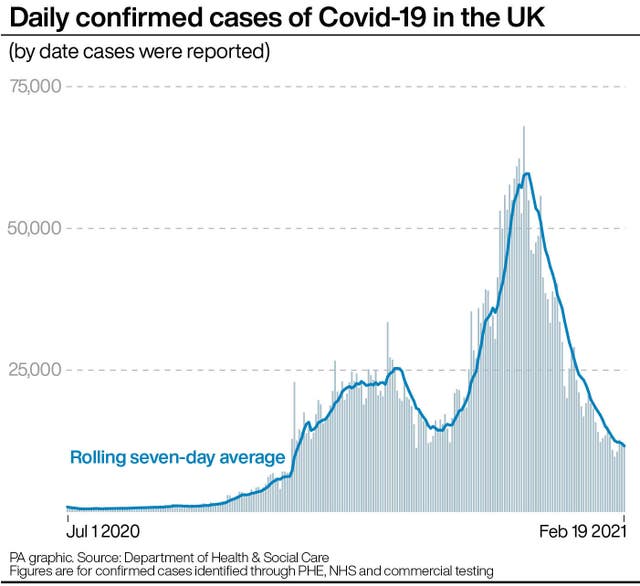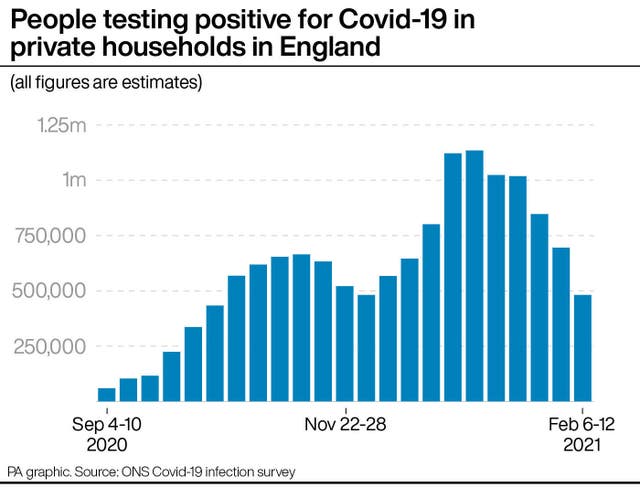Holding hands on care home visits to be allowed under lockdown easing plans
Prime Minister Boris Johnson will set out his blueprint for relaxing measures in England on Monday.

Care home residents will be allowed to hold hands with a loved one again from March 8 under the Government’s roadmap for easing coronavirus restrictions.
The resident’s nominated visitor will be allowed to see them indoors, but will be required to take a lateral flow test before entry and wear personal protective equipment (PPE).
They will be allowed to hold hands with their friend or relative, but will be asked not to hug or kiss them to reduce the chance of spreading Covid-19.
Outdoor visits – as well as those inside pods or behind screens – will be able to continue, giving residents the chance to see more than just their nominated visitor.

Meanwhile families and friends look set to be allowed to gather in parks and gardens by Easter with rules relaxed to allow two different households to meet outside.
Health Secretary Matt Hancock said he was “pleased” that it would soon be possible for people to be “carefully and safely reunited with loved ones who live in care homes”.
The Government met its target to offer all care home residents – along with social care and NHS staff, all those aged over 70 and the most clinically vulnerable – a vaccine by February 15.
Scientists believe the vaccines become effective after three weeks, meaning by March 8 all those who accepted a vaccine should have a good level of protection from Covid-19.
As part of the relaxations, The Sun said there have also been discussions about reintroducing the “rule of six”, to allow people from different households to meet from Easter.
However, a Government source described the reports as speculation.
Schools also look set to reopen to all pupils from March 8, with several papers reporting that both primary and secondaries will return in just over three weeks.
The move comes despite a coalition of education unions and professional bodies warning that a full return of all pupils would be a “reckless” course of action.
Boris Johnson will set out the blueprint for relaxing measures in England on Monday – the final details of which will be agreed at a meeting of the “Covid O” committee on Sunday.
The Prime Minister will then chair a meeting of his Cabinet on Monday, before announcing the plans to the Commons later that afternoon.
He is expected to lead a Downing Street press conference that evening alongside England’s chief medical officer Professor Chris Whitty and scientific adviser Sir Patrick Vallance.
The relaxation comes amid a backdrop of promising data suggesting coronavirus infections are dropping across the UK.
Around one in 115 people in private households in England had Covid-19 between February 6 and 12, the Office for National Statistics (ONS) said, down from around one in 80 people from January 31 to February 6.

Meanwhile, in Wales, around one in 125 people are estimated to have had Covid-19 between February 6 and 12, down from one in 85 previously.
In Northern Ireland, the figure is around one in 105 people, down from one in 75, while in Scotland it is around one in 180 people, down from one in 150.
The data, which does not cover care homes and hospitals, is based on swab tests from thousands of people regardless of whether or not they have symptoms.
Elsewhere, new analysis from Oxford University published in The Lancet confirmed that a single dose of the AstraZeneca vaccine offers 76% protection against Covid-19 from 22 days after vaccination, and that this had not waned by the three-month mark.
The UK policy of leaving up to 12 weeks between doses also resulted in a higher efficacy overall, the study found.





